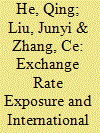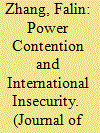|
|
|
Sort Order |
|
|
|
Items / Page
|
|
|
|
|
|
|
| Srl | Item |
| 1 |
ID:
180470


|
|
|
|
|
| Summary/Abstract |
Long-term care (LTC) policies are urgently needed for required services, including workforce support and insurance planning. China has a large population and just recently entered an aging stage, whereas Taiwan is about to become a super-aged society. China and Taiwan have similar cultural context, sharing the same value of Chinese filial piety and living habits although they have distinct political systems. Results shows that there is no silver bullet that would solve the current shortage of an LTC workforce that would fill the gap between care recipients and licensed professionals or informal caregivers. It is clear that action is required in all the aspects of LTC reform. The Taiwan system is comparatively solid while China’s system is struggling despite well-planned policy making.
|
|
|
|
|
|
|
|
|
|
|
|
|
|
|
|
| 2 |
ID:
180462


|
|
|
|
|
| Summary/Abstract |
This article examines popular nationalism and regime support in the Xi era by evaluating news comments from a major overseas Chinese website on the 2018 constitutional amendments removing presidential term limits. It finds that the event was not only contested among overseas and domestic Chinese, but also has alienated many nationalists who previously supported the regime. Even the subsequent pro-regime discourse is less focused on support for Xi or the regime, and more about distrust of the West and dissidents. However, some citizens have become less critical toward the regime out of the concern of external threats. The findings confirm the Xi Jinping effect on nationalist regime support, and show how China’s international and domestic environments may activate nationalist sentiment differently.
|
|
|
|
|
|
|
|
|
|
|
|
|
|
|
|
| 3 |
ID:
180465


|
|
|
|
|
| Summary/Abstract |
This study focuses on the effects of the United States (U.S.) anti-dumping policy targeting China’s steel products, based on the HS 10-digit code monthly data from 1995 to 2015. It shows that as soon as the U.S. government implemented the affirmative preliminary ruling of an anti-dumping case, the volume of Chinese exports to the U.S. decreased regardless of the outcome of the final ruling. In the meantime, the U.S. imports of the involved products from other competing countries increased. It further finds that China’s exports of the impacted products were diverted to the third-party countries, most of which were developing countries. This finding is contrary to those of studies from other industries such as textiles and agricultural products.
|
|
|
|
|
|
|
|
|
|
|
|
|
|
|
|
| 4 |
ID:
180468


|
|
|
|
|
| Summary/Abstract |
This study analyzes how exchange rate risk exposure and foreign industry competition affect Chinese industries. Using the data from 2005 to 2018, the authors find that industry competition from the US has a statistically significant influence on 33.3 percent of Chinese industries. Unsurprisingly, tradable goods benefit more from depreciation of the Renminbi against the US dollar. Counterintuitively, only 20 percent of the industries supported by the ‘Made in China 2025’ initiative is sensitive to US industrial competition. In addition, on average Chinese industries face international competition from few developed countries, such as the Netherlands; and depreciation of RMB against the Japanese yen is hurting Chinese industries on average. Developing countries, however, exert marginal competition effects on their Chinese counterparts in the sample period.
|
|
|
|
|
|
|
|
|
|
|
|
|
|
|
|
| 5 |
ID:
180467


|
|
|
|
|
| Summary/Abstract |
Cultural security has become a major watchword in the national security discourses of both the People’s Republic of China and the Kingdom of Saudi Arabia. Within this discourse, overseas study has been imagined as a conduit for cultural and ideological subversion threatening the authority of the prevailing regimes. At the same time, overseas study has been actively encouraged by both the Chinese and Saudi states as an important element in their modernization projects. In the past two decades, the Chinese and Saudi overseas student populations have been some of the largest in the world. The article seeks to explore these tensions by examining the conceptualization and practice of cultural security in the PRC and Saudi Arabia through their management of overseas study.
|
|
|
|
|
|
|
|
|
|
|
|
|
|
|
|
| 6 |
ID:
180463


|
|
|
|
|
| Summary/Abstract |
Despite persistent skepticism towards the Belt and Road Initiative (BRI), many countries have signed on to the program and even more countries have come to believe in its transformative potential to development finance and the global order. How has the illiberal Chinese government succeeded in convincing the world, particularly the Global South, about its commitment and BRI’s future success? Exploring the credibility puzzle, this article argues that the Xi Jinping administration has relied on an all-in strategy tying the BRI to China’s national development and foreign policy, promoting the BRI through select international institutions, and launching a series of flagship mega-projects. With mounting sustainability challenges on both economic and geopolitical fronts, however, the BRI now has to scale back its ambitions while China reevaluates its strategic opportunity.
|
|
|
|
|
|
|
|
|
|
|
|
|
|
|
|
| 7 |
ID:
180460


|
|
|
|
|
| Summary/Abstract |
This article compares Xi Jinping with Deng Xiaoping from two perspectives: first, how their differing backgrounds influenced how they played the role. Second, how the situation of China in 1978 when Deng became the top leader differed from the situation in 2013 when Xi became the top leader and how this influenced the way they played their role.
|
|
|
|
|
|
|
|
|
|
|
|
|
|
|
|
| 8 |
ID:
180461


|
|
|
|
|
| Summary/Abstract |
Xi Jinping’s anti-corruption drive, personnel reshuffles, and institutional overhauls seem to mark a turning point in Beijing’s long-running fight against ‘localism’ (difangzhuyi). Yet, key questions remain about the scope and effectiveness of efforts to rein in China’s subnational officials. Has the Xi administration effectively combated localism by appointing more outsiders to provincial leadership teams? Or have strengthened oversight institutions made subnational officials more responsive to the center regardless of their individual backgrounds? To address these questions, this article distinguishes between different types of localism in contemporary China and the varying personnel ‘risk factors’ underlying them. Comparing the makeup of provincial party standing committees under Xi Jinping’s 18th CPC Central Committee (2012–2017) with those from the 15–17th CPC Central Committees under Jiang Zemin and Hu Jintao (1997–2012), the analysis finds that Xi has accelerated personnel changes to address multiple forms of localism. At the same time, gaps in governance outcomes between local cadres and outsiders have faded since 2012 in several domains, implying that Xi-era institutional reforms have also played a role in curbing localism. Even under Xi, however, important personnel risk factors for localism have persisted and in some domains local-outsider differences in governance outcomes have actually increased.
|
|
|
|
|
|
|
|
|
|
|
|
|
|
|
|
| 9 |
ID:
180464


|
|
|
|
|
| Summary/Abstract |
The China–US financial contention or confrontation comes to the fore, given the pivotal role of finance in the international system and the current international order transition. Will there be destructive conflicts or a Thucydides Trap in China–US financial relations? By adopting a power analysis framework, the China–US financial contention is observed from four types of international financial power: structural, relational, institutional and ideational. The competition for these powers results in reform divergence of global financial governance and thus international financial insecurity. The contention and consequent insecurity, however, do not necessarily mean an inevitable ‘Thucydides Trap’ in China–US financial relations. Elaborated and issue-specific ways of management could alleviate the contention, including shunning RMB-USD strategic confrontation, refraining from a debt weapon and aggressive imbalance adjustment, enhancing the legitimacy of international financial institutions and avoiding a new Cold War.
|
|
|
|
|
|
|
|
|
|
|
|
|
|
|
|
| 10 |
ID:
180469


|
|
|
|
|
| Summary/Abstract |
This study examines the cultural representations of Chinese military-action films which re-interpret China’s non-intervention policy and give China’s foreign engagements rationality and legitimation. It involves two narrative strategies: (1) framing the protection of nationals abroad as the key incentive behind China’s military actions; and (2) emphasizing an unquestioning commitment to sovereignty, to UN authorization, and to the consent of host countries during the intervening process.Then, it points out the propagandistic features of China’s military-action films: framing the outside world as a threatening place in which individuals’ survival depends on the protection of a powerful nation; cultivating collective narcissism and nationalism; and reframing China’s global economic expansion through a“friendship narrative”.
|
|
|
|
|
|
|
|
|
|
|
|
|
|
|
|
| 11 |
ID:
180466


|
|
|
|
|
| Summary/Abstract |
China’s post-1978 modernization plans include an internationally competitive higher education system. Central to this effort are researchers and professors capable of advancing China’s technological capabilities and educating its ambitious, globally-minded youth. National funding for scholars going abroad was designed to infuse the nation with sophisticated knowledge and to improve university quality. Research on 131 Chinese scholars who spent significant time abroad, mostly in the United States, shows little evidence that these funded experiences abroad were used deliberately to improve Chinese universities. Results show that policies supporting scholarly exchange have not produced successful internationalization efforts on Chinese campuses. Scholars in STEM fields and those receiving national funding indicated significantly higher research focus and productivity, however did not indicate putting it to use at their home institutions.
|
|
|
|
|
|
|
|
|
|
|
|
|
|
|
|
|
|
|
|
|